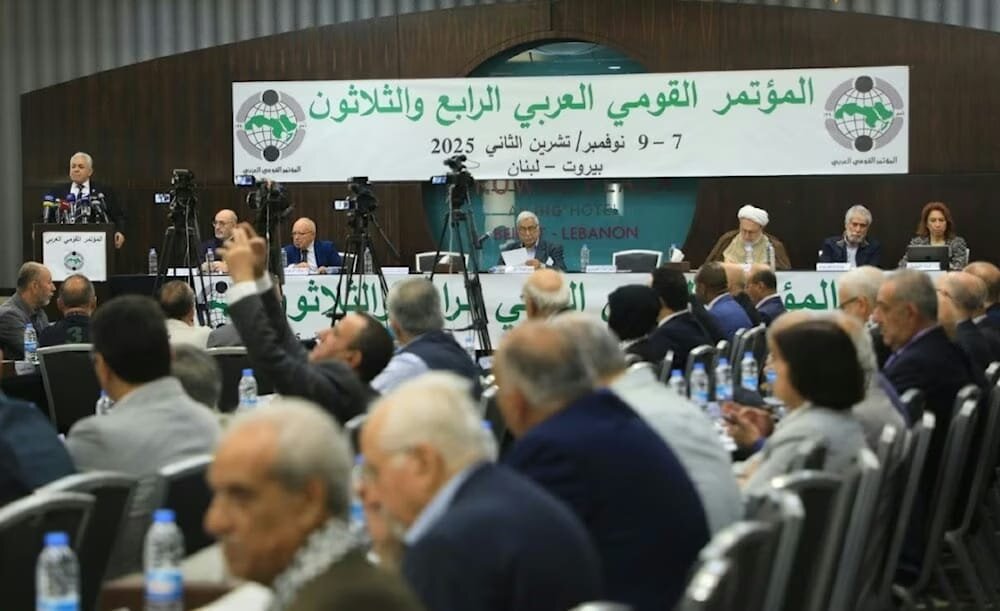Voices of resistance dominate Beirut forum

BEIRUT — The 34th session of the Arab National Conference opened in Beirut on Friday with the participation of more than 250 political, intellectual, and academic figures from across the Arab world.
The gathering aimed to reassess the Arab nationalist project, articulate a collective strategy to confront Western hegemony and normalization with Israel, and reaffirm support for resistance movements in Palestine, Lebanon, Yemen, and other scenes of confrontation.
Representing Hezbollah’s Secretary-General Sheikh Naim Qassem, the party’s Arab Relations Officer, Ammar al-Moussawi, affirmed that Hezbollah “is not regretful for the decision to support Gaza,” describing it as “one of the most honorable and noble choices in the history of the resistance.”
Al-Moussawi said that the Al-Aqsa Flood Operation was “a moment of unparalleled steadfastness and dignity,” adding that “two years after the operation, the enemy still flounders in confusion, waging a war with full Western backing led by the United States, yet unable to retrieve its captives except through negotiation.”
Al-Moussawi criticized Western leaders who “rushed to the Israeli entity after the operation,” noting that their actions revealed that the Zionist regime is “an integral arm of the Western colonial system.”
He recalled that “even U.S. President Donald Trump praised Israeli soldiers in the Knesset, confirming complete partnership in the wars waged against the peoples of the region.”
Al-Moussawi stressed that the confrontation is not merely with Israel but “a Western colonial war seeking to weaken the region,” asserting that Hezbollah’s participation in the Gaza front was “a conscious, moral, and national choice.”
Al-Moussawi praised the roles of the resistance fronts in Lebanon, Iran, Yemen, and Iraq, particularly Ansarallah in Yemen, for their “strategic contribution in besieging the Zionist entity and striking deep inside the occupied territories.”
In a televised speech, Sayyed Abdul-Malik al-Houthi, the leader of Ansarallah, also pointed out that the Israeli enemy is seeking to impose “a new Middle East under Zionist domination,” warning that “some still remain heedless of their responsibilities amid two years of open aggression.”
Al-Houthi emphasized that the resistance axis—from Gaza to Lebanon—had “forced the enemy to halt its aggression through steadfastness and the golden equation of the army, the people.”
He praised Hezbollah’s “pioneering and decisive role” on the support fronts and condemned attempts to “distort Iran’s supportive role toward Arab causes.”
The Yemeni leader urged Arab nations to “preserve and strengthen all elements of power to defeat Israel’s project and protect regional sovereignty.”
Addressing the conference, Ziad al-Nakhaleh, Secretary-General of the Palestinian Islamic Jihad, said despite unprecedented destruction, “the resistance remains in the field with its weapons intact,” stressing that “all factions stood united both militarily and politically,” a unity that enabled steadfastness “against overwhelming aggression.”
Other speakers reiterated the centrality of the resistance and Arab unity. Ma’an Bashour, the founding president of the Arab National Forum, said that “the idea of resistance remains the core guarantee for the renaissance of the Arab nation.”
Conference Secretary-General Hamdeen Sabbahi also stressed that “our task today is to refute the narrative of the nation’s defeat,” asserting that “the Arab nation has triumphed, and the day of Palestine’s liberation is drawing near.”
Concluding the session, George Ibrahim Abdallah, the Lebanese revolutionary and former political prisoner, described the conference itself as “an act of steadfastness and defiance against imperial conspiracies targeting the region.”
